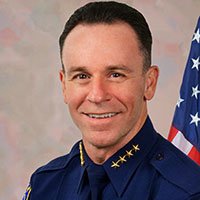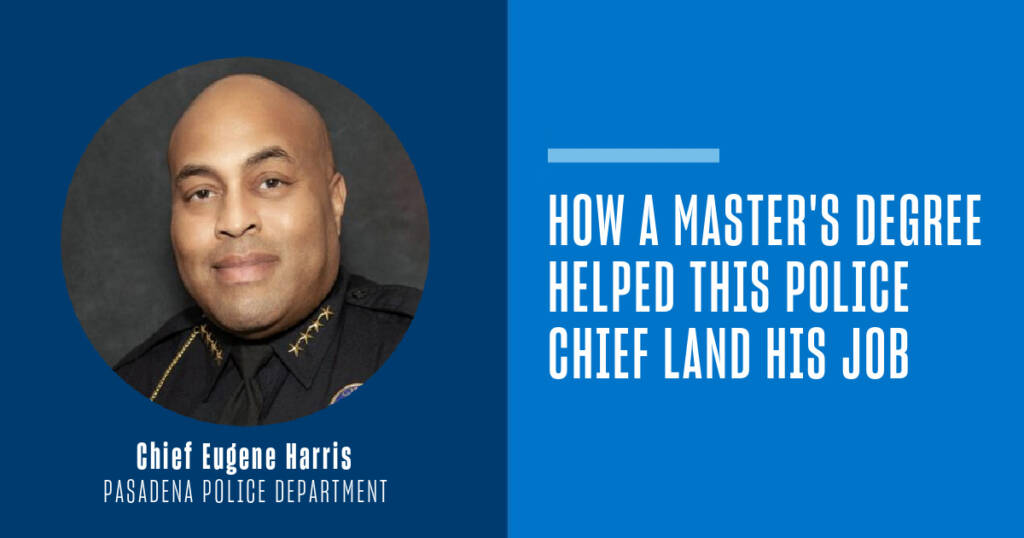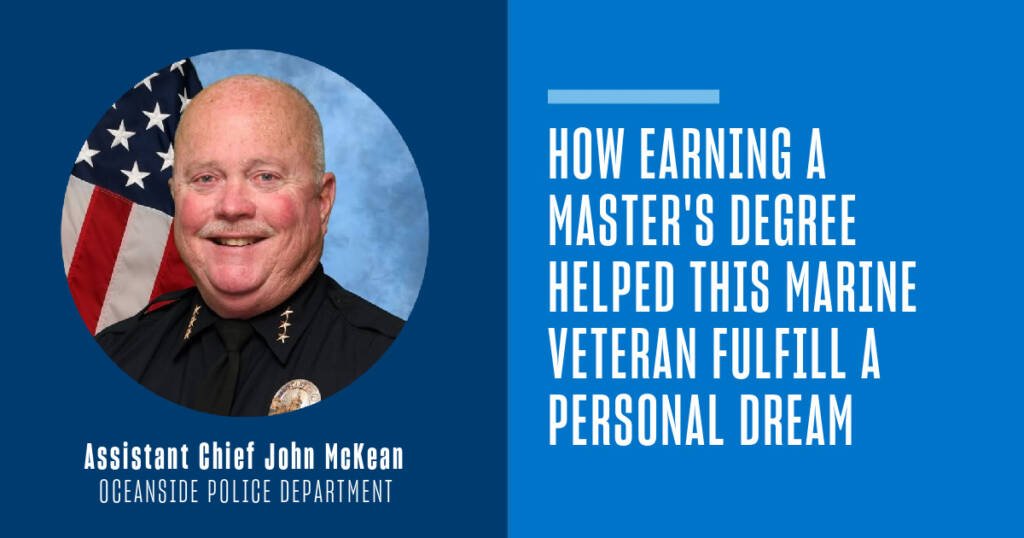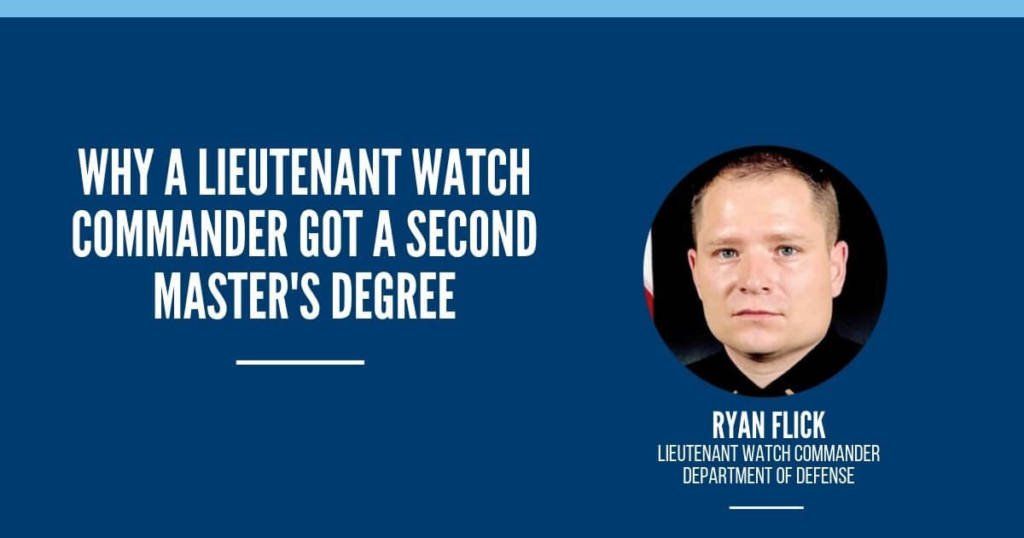“Look for opportunities to increase your skills, to increase your knowledge base. Always be learning, throughout your career.”
— Frank Grgurina, Chief of Public Safety (Ret.), Sunnyvale, Calif.
For law enforcement professionals aspiring to move up the ranks and earn a command staff position or job as chief of police, the best advice often comes from those who have already walked many miles in their shoes.
Here you will find front-line advice from two experienced police chiefs — Frank Grgurina, former chief of public safety in Sunnyvale, Calif., and Gary Morrison, former chief of police in Carlsbad, Calif.
Both law enforcement veterans agreed that, whether you aspire to become a police chief or to serve in leadership as part of the command staff, you will be well served to focus on three fundamentally important areas. In fact, Morrison described these areas as a critically important “three-legged stool” — training, experience and education.
Training: Seek Out Opportunities for Professional Growth
Both retired police chiefs said that, in addition to the rigorous training required to enter police work in the first place, law enforcement professionals should seek out opportunities for advanced training. Such training is offered in a diverse range of subject areas, including firearms, narcotics, gang-related activity, terrorism, tactical proficiency, management and supervision, community relations and much more.

Taking advantage of job-related training “diversifies you” and “makes you more well-rounded,” said Morrison, who served as chief of police in Carlsbad, Calif. from 2010 to 2015 after working for 23 years with the Long Beach (Calif.) Police Department, rising through the ranks from officer to police commander. His own training included participating in the FBI National Academy program, as well as an innovative Los Angeles Police Department program that was modeled after the cadet training at West Point.
Chief Grgurina, who retired as chief of public safety in Sunnyvale, Calif., in 2016, said his career benefited from leadership training at California’s POST (Peace Officer Standards and Training) Command College and the Sherman Block Supervisory Leadership Institute. Following a lengthy career with the Fremont (Calif.) Police Department that spanned many different roles and included experience as a Field Training Officer, Grgurina encourages officers who are interested in promotion to spend time focusing on their career goals and then “find training opportunities that align with those goals.”
Experience: Serve in a Variety of Law Enforcement Roles

Just as it makes sense to develop advanced skills through training, seeking out different types of law enforcement experience while on the job is also absolutely essential, according to Grgurina. During his career, Grgurina gained experience through a wide variety of assignments and responsibilities, including as a narcotics investigator, detective, SWAT commander and more.
“If you want to be a chief or in a leadership role,” Grgurina said, it helps to develop an understanding of all of the other roles within an agency or department. For example, he recalled that being appointed to oversee the dispatch center, an experience that yielded insight into strengths and weaknesses around communications, was “one of the greatest growth experiences for me.”
Saying he believes it is important to constantly challenge yourself, Grgurina urges career-focused officers to seek opportunities to “raise your hand to take the lead on a project” and “look for those positions that help build leadership skills.” Overall, he advised, “Don’t get too comfortable. Always look for that next challenge, so you’re always on the edge of your seat.”
For Morrison, those challenges included serving on gang patrols, SWAT teams and as a detective and motorcycle officer during a diverse career that included valuable experience managing large crime scenes and events.
“I think its important to put in for those assignments, and be good at those assignments,” said Morrison, reasoning that “the more you’ve seen, the better you’re able to respond to the unexpected.” Being an effective law enforcement executive often involves handling challenging situations in which the right decision is not always obvious. “You’ve got to be very comfortable in that gray area,” he said, “because everybody is looking at you to make a decision.”
Education: Enhance Your Skills and Resume with an Advanced Degree
A master’s degree, though not always required when applying for a police leadership role, is increasingly expected and often serves as a differentiator among candidates competing for a top law enforcement job. Advanced education complements the essential components of training and experience by offering immersive study in such essential police management competencies as organizational leadership, data analysis, critical-thinking and conflict resolution, public safety law, budgeting and staffing, and communication.
“The academic piece is huge,” said Grgurina, who earned a master’s degree in Leadership from St. Mary’s College of California. Morrison said he believes his master’s in Organizational Leadership from Chapman University definitely gave him a competitive advantage when he landed the top job in Carlsbad.
Morrison and Grgurina are true believers when it comes to the role of advanced education for those aspiring to police leadership. Both have followed up their distinguished law enforcement careers by transitioning into the academic world — today serving on the faculty of University of San Diego’s 100% online master’s degree in Law Enforcement and Public Safety Leadership program.
With a curriculum focused on building practical leadership skills and addressing contemporary issues, students in the USD program benefit from interactions with fellow police and law enforcement professionals from across the nation. For example, Grgurina said that in one recent course one student was an officer from Las Vegas who shared insight from his experience working the tragic October 2017 mass shooting.
[RELATED] See a list of agencies represented in the M. S. Law Enforcement Leadership program >>
“A lot of agencies are dealing with a lot of different issues. We can all learn from each other,” said Morrison, noting that during a recent course that covered the impact of marijuana legalization a student who works in a sheriff’s department in Colorado was able to provide unique insight into the issue.
“I have been very impressed by the work done by the students,” said Grgurina, who enjoys sharing his experience and providing mentorship to the next generation of law enforcement leaders. The USD program, he said, offers the high-quality, practical education that employers are looking for. When applying for an executive leadership role in law enforcement nowadays, he said, a master’s degree is “either required or it’s something they really want to see the applicant have.”
While some law enforcement officers may fear that the demands of full-time police work might make it difficult to go back to school, students in USD’s program have found the online format offered greater flexibility to balance academics around the demands of family life and their law enforcement duties.
“I know how tough it is, balancing life and a full-time job in law enforcement. They’re working different shifts; they’re working weekends,” said Grgurina, adding that it’s not unusual for his students to log on to the online learning portal at midnight or at 2 o’clock in the morning.
“This program was essential for me because of my hectic schedule and having family and career, I was able to balance both,” said program graduate Frank Alvarado, a supervisory border patrol agent with the Department of Homeland Security. “I think the best thing for me as a law enforcement professional is that we really got to talk to other law enforcement professionals. It was not just traditional brick and mortar school; you learn from people from all over the country.”
“A master’s degree exemplifies your commitment to learning, and the knowledge you acquire will enhance your skillset,” added Jennifer Malis-Estrada, jail administrator with the Santa Monica (Calif.) Police Department. “Managing a contemporary police agency is a complex, demanding profession that requires a motivated and educated individual. The MS-LEPSL program at USD prepares you for these challenges and responsibilities.”




